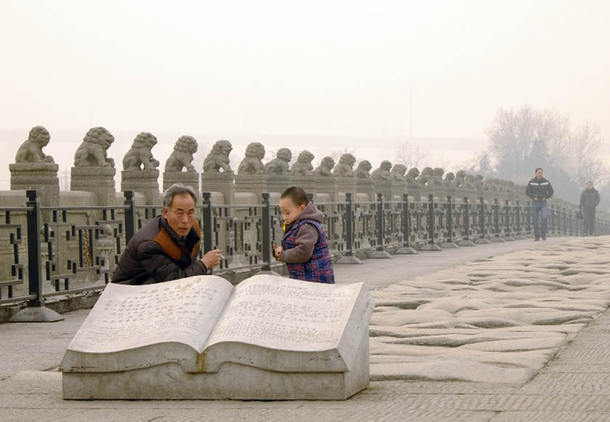The Fallacy about China’s Anti-Japan Sentiments
By WANG TAIPING
 |
|
A man with his grandson on Lugou Bridge in the southwestern suburbs of Beijing. On July 7, 1937 Japanese forces fired at Chinese soldiers garrisoned at the bridge after their request to enter Wanping County was rejected. The incident was the prelude to Japan’s overall invasion of China. |
The Chinese government and people are not against Japan or its people, but rather those rightwing forces that purposely sabotage Sino-Japanese relations for political gain. China’s protests over Japan in recent years have focused on such rightwing forces in that country.
Territorial and historical issues are highly pertinent to bilateral ties. Yet Japanese lawmakers from time to time make provocative moves in this regard, thereby endangering China’s sovereign rights and offending the Chinese people. How could Japan expect China to sit back and keep silent in such a situation? “Waves surge due to strong winds, and water is left at peace after tides recede,” so goes the Chinese saying. Japanese leaders should look to their own behavior as to why China responds so strongly to some of their words and deeds.
The tension now evident in Sino-Japanese relations is not between the two peoples, but between Japan’s rightwing forces and the Chinese people – or more accurately – the Chinese and Japanese people combined. For rightwing activists, making “China’s anti-Japan sentiments” and “China threat” allegations are steps toward revising the Pacifist Constitution, rebuilding a more active army with greater power, and exercising the right of collective self-defense, empowering Japan with the right of external war. This is a dangerous trend for a country whose government refuses to face history squarely and recognize past wrongs. Japan’s right of external war could not only threaten peace and stability in Asia, but also put its own people in peril.
Average Japanese citizens have also fallen victim to the country’s militarism. Japan’s defeat in WWII took a heavy toll on its international status, a consequence any invading nation rightly deserves. But it is everyday people who have borne the brunt of suffering. They have for generations lived under the lingering shadows of that war. In this regard, we understand Japanese people’s desire for their country to return to normality. But, in fact, the “normal country” notion touted by Shinzo Abe does not mesh with what the Japanese public envisions. Moreover, the unresolved question in this issue is, how will Japan reach this goal?
In my opinion, it is only through adhering to the path of peaceful development, adopting an appropriate attitude towards history and behaving accordingly that Japan can repair its image among other Asian countries and across the world. Otherwise, its efforts to become a normal country will come to no avail. Neither the international community nor its own people will accept a Japan that denies history and strays from peaceful development. It is also counterproductive for Japan to foul its relations with neighboring countries, by taking China as its imagined enemy or inciting nationalist sentiments.
Eric Heginbotham, senior political scientist and professor of Pardee RAND Graduate School at the RAND Corporation, once commented that the best approach for Japan to move forward is to frankly admit the sins of its imperialist era, so as not to pass on its past follies to future generations.
